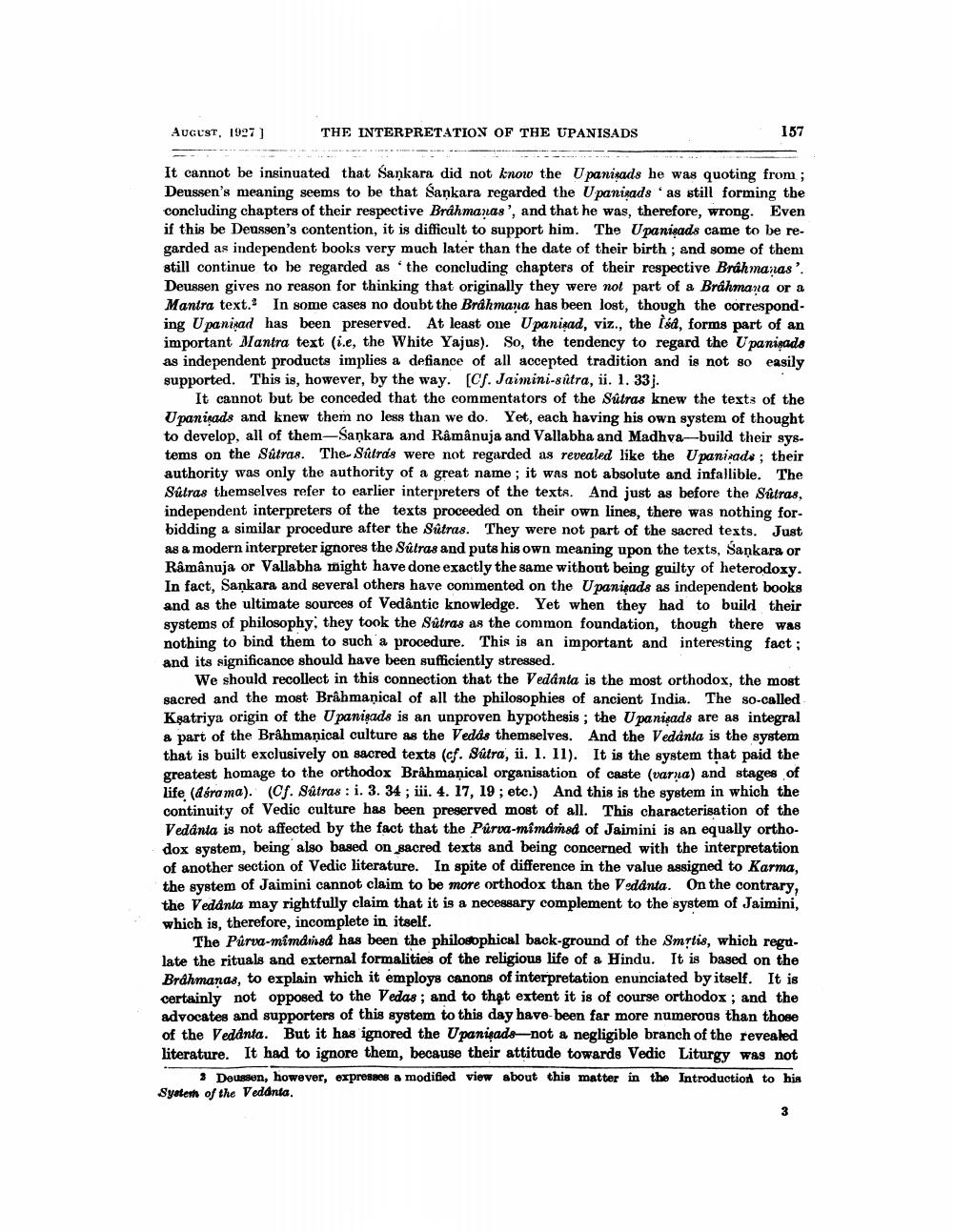________________
AUGUST. 1927]
THE INTERPRETATION OF THE UPANISADS
157
ELISTVOST LIKEHOLI
It cannot be insinuated that Sankara did not know the Upanisads he was quoting from ; Deussen's meaning seems to be that Sankara regarded the Upanigads as still forming the concluding chapters of their respective Brahmaras', and that he was, therefore, wrong. Even if this be Deussen's contention, it is difficult to support him. The Upanigads came to be regarded as independent books very much later than the date of their birth; and some of them still continue to be regarded as the concluding chapters of their respective Brahmanas'. Deussen gives no reason for thinking that originally they were not part of a Brahmana or a Mantra text. In some cases no doubt the Brahmana has been lost, though the correspond ing Upaniad has been preserved. At least one Upanigad, viz., the lód, forms part of an important Mantra text (i.e, the White Yajus). So, the tendency to regard the Upanigado as independent products implies a defiance of all accepted tradition and is not so easily supported. This is, however, by the way. [Cf. Jaimini-sitra, ii. 1. 33).
It cannot but be conceded that the commentators of the Sútras knew the texts of the Upaniads and knew them no less than we do. Yet, each having his own system of thought to develop, all of them-Sankara and Râmânuja and Vallabha and Madhva-build their sys. tems on the Sútras. The-Sutra's were not regarded as revealed like the Upanixads; their authority was only the authority of a great name; it was not absolute and infallible. The Sútras themselves refer to earlier interpreters of the texts. And just as before the Sitras, independent interpreters of the texts proceeded on their own lines, there was nothing forbidding a similar procedure after the Sútras. They were not part of the sacred texts. Just as a modern interpreter ignores the Sútras and puts his own meaning upon the texts, Sankara or Râmânuja or Vallabha might have done exactly the same without being guilty of heterodoxy. In fact, Sankara and several others have commented on the Upanigads as independent books and as the ultimate sources of Vedântic knowledge. Yet when they had to build their systems of philosophy, they took the Sütras as the common foundation, though there was nothing to bind them to such a procedure. This is an important and interesting fact; and its significance should have been sufficiently stressed.
We should recollect in this connection that the Vedanta is the most orthodox, the most sacred and the most Brâhmaņical of all the philosophies of ancient India. The so-called Ksatriya origin of the Upanigads is an unproven hypothesis ; the Upanisads are as integral a part of the Brāhmaṇical culture as the Vedas themselves. And the Vedanta is the system that is built exclusively on sacred texts (cf. Sútra, i. 1. 11). It is the system that paid the greatest homage to the orthodox Bråhmaṇical organisation of caste (varna) and stages of life (dérama). (Cf. Satras : i. 3. 34 ; iii. 4. 17, 19; etc.) And this is the system in which the continuity of Vedic culture has been preserved most of all. This characterisation of the Vedanta is not affected by the fact that the Purva-mimamsd of Jaimini is an equally orthodox system, being also based on sacred texts and being concerned with the interpretation of another section of Vedic literature. In spite of difference in the value assigned to Karma, the system of Jaimini cannot claim to be more orthodox than the Vedanta. On the contrary, the Vedanta may rightfully claim that it is a necessary complement to the system of Jaimini, which is, therefore, incomplete in itself.
The Purva-mimdnsd has been the philosophical back-ground of the Smộtis, which regulate the rituals and external formalities of the religious life of a Hindu. It is based on the Brahmanas, to explain which it employs canons of interpretation enunciated by itself. It is certainly not opposed to the Vedas; and to that extent it is of course orthodox; and the advocates and supporters of this system to this day have been far more numerous than those of the Vedanta. But it has ignored the Upanisado-not a negligible branch of the revealed literature. It had to ignore them, because their attitude towards Vedic Liturgy was not
* Deusson, however, expresses a modified view about this matter in the Introductiod to his System of the Vedanta.
H




